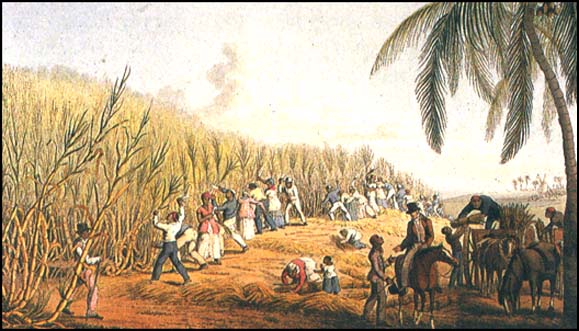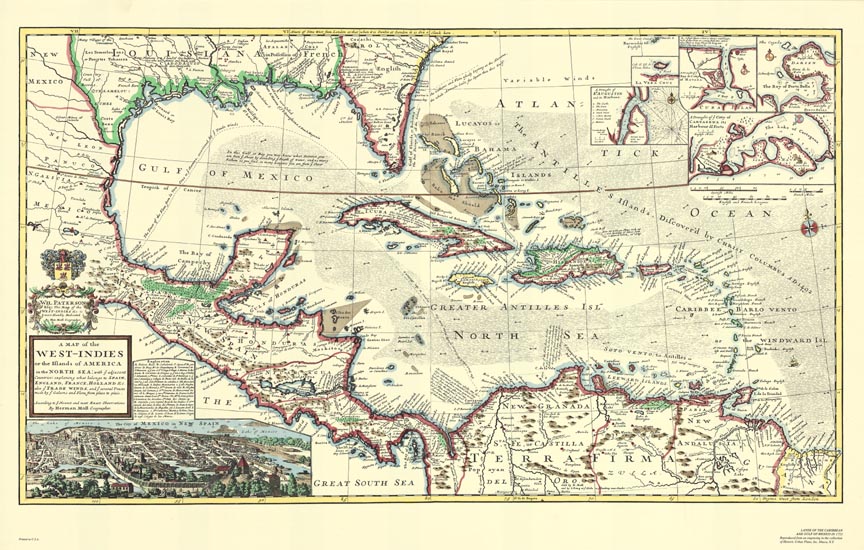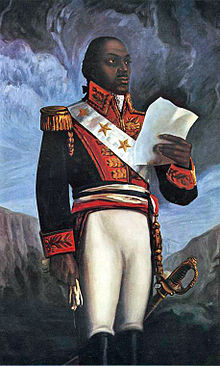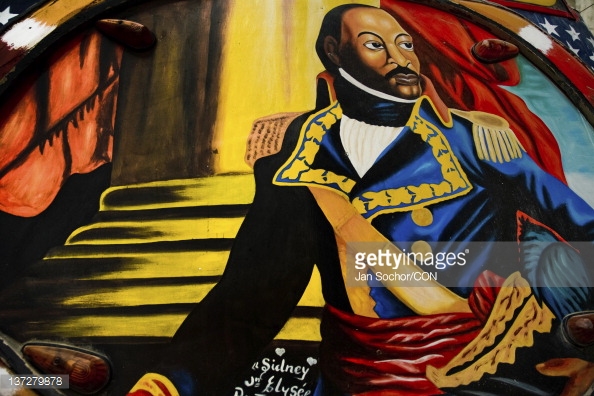In the beginning of the 17th century Haiti’s island started off as a pirate outpost. The pirates, and the people who occupied the island made their living by selling leather and a kind of smoked beef called bukan. They had beef, because cattle was left behind from the Spanish. The Spanish were the first Europeans who settled in Haiti. Not to long after 1640 the pirates started robbing Spanish ships that had mined silver from South America. The pirates started doing this, because bukan sellers started running low on beef and they could make more money by robbing ships.

The French colonials convinced captains to stop pirating and settle on the island by the middle of 17th century. Once they agreed, they invested in sugar plantations with some of their treasures. Sugar plantations were thriving at producing sugar and slavery by 1700. Haiti was the most valuable colony in the West Indies maybe even in the whole world at this point. Haiti produced 40% of Europe’s sugar and 60% of their coffee.
Besides Brazil, Haiti was home to more slaves than any place. France was at war with most of Europe by 1781. In 1791 the national assembly gave full freedom to all free men and women of color, if they owned land, had money, and weren’t children of slaves. Also by 1791 slaves had enough, and a massive slave revolt broke out, the leader was Toussaint L’Ouverture. He helped mold the slaves into a very disciplined army who can withstand attacks from the french troops. Emancipation for the slaves was more important to L’Ouverture than maintaining his rights as a french citizen, so became a officer in the Spanish military.

 The quotes below are a few of Toussaint L’Ouverture’s
The quotes below are a few of Toussaint L’Ouverture’s
“We have known to face dangers to obtain our Liberty , we shall know how to brave death to maintain it.”
” God knows our most secret thoughts and who sees all, is witness to the purity of my principles . They are not founded on this barbarous ferocity that takes pleasure in shedding human blood.
Who was Toussaint L’Ouverture?
Former slave in Haiti
Educated in Enlightenment Social Contract Ideas
Led the military revolution against France at the same time as the French Revolution 1791= 100,000 slaves rose up in Haiti – total of 500,000 slaves outnumbered French and light skinned masters.
He was eventually captured by Napoleon’s French troops and he died in Prison in the French Alps in 1803. He inspired the first and only successful free black democratic republic in the Western Hemisphere in the 19th century.
Haiti had been a place for French pirates but then it became a place for French Sugar Plantations. The social change in the revolution got rid of the few whites and it won power for the Gens de Coleur = Educated and wealthy people of color.

The geography and the economics of Haiti stayed the same so the power structure also stayed the same. The blacks were free but they had no power. There was no real middle class of owners so there was no real democracy for most. John Locke said all democratic citizens should have life, liberty, and property but many of the new free black people did not own any property and only had jobs on the sugar plantations.
http://www.pbs.org/independentlens/natturner/slave_rebellions.html = a timeline of slave revolts in North America. Why did it take so long for African Americans to find political equality?
Political equality went together with equal economic and social opportunity. Citizenship for free blacks in America did not come until the 13th, 14th, and 15th Amendments after the US Civil War ended in 1865.
https://youtu.be/BBH3Xzz3Y3E%20
What did you learn? I learned about Nat Turner’s’ 1831 Slave rebellion. The Virginians and white people shot off the black people. The rebellion did not succeed because the ones who fought were killed and others became too scared to fight.
What did you learn? Harriet Tubman was a slave in the early nineteenth century. She was born and raised in the American south. She had many jobs as a slave. She escaped with her brothers but she came back to the South to help others escape. Her organization was like a peaceful slave revolt because it helped slaves escape one family at a time. This revolution was known as the underground railroad. She would be going to sleep and staying in safe houses during the day because she only traveled at night. She didn’t want anyone to change their mind and turn around and so she organized safe places with other abolitionists. The abolitionist movement was like a family of people who wanted to treat everyone as equal in their natural rights.
The African American Revolt is a story of over 300 years of struggle. From the first successful Democratic revolution in Haiti in 1821 to the dream of Dr. Martin Luther King proclaimed 100 years after the American Civil War.
Martin Luther King “I have a Dream”
Black Lives Matter is a movement today that continues to be a voice of revolt to the injustice of racism in America.

The video shared below is J. Cole’s song G.O.M.D.. For starters I know he says ” Get off my d@$%” a lot, but the song & the video is much more deep than that to be honest. If you’re actually focusing on the lyrics instead just listening to the cuss words you will not understand his message. The video can be somewhat violent but it depicts our African American reality & the struggles we’ve faced as a culture from slavery, racism, genocide and more. You may not like what he is talking about but you can’t be blind and mute to our history as a nation. The truth may hurt for some but we the people can’t run from it forever. J. Cole is speaking about a hate & how we need love and how much we lack giving it to others. Love comes in many forms. This image of all the nice feelings of romantic love can be used to express the fraternal love of a more perfect union.
“Young n@#$$ never had love
You know, foot massage, back rub s@#$
Blowing bubbles in the bathtub s@#$
That is until I met you
Together we done watch years go by
Seen a river of your tears go by
Got me thinkin’ bout some kids, still I
Tell them hoes come through
(The break up)
Get to know somebody & you really learn a lot about em’
When we long for you, start to doubt ’em
Tell yourself you better off without ’em
Then in time you will find can’t walk without ’em
Can’t talk without ’em, can’t breath without ’em
Came here together, you can’t leave without ’em
So you walk back in, make a scene about ’em
On your Amerie it’s just 1 thing about ’em
It’s called love
N@##s don’t sing about it no more
Don’t nobody sing about it no more”
And those are some very powerful lyrics, but if you were being limited by the words just listening to him say get off my d&^%, you wouldn’t have caught that. He’s echoing Nat Turner by staging a slave revolt. Nat Turner was an enslaved African-American who led a rebellion and freedom fight in Southhampton County, Virginia on August 21st,1831. He’s the house slave, and he’s outside and see’s the field slaves & says hey but they don’t like him or feel as if he’s not black and gets treated better than the, because he’s in the house. So not only is there racism between whites and blacks, but also racism against other blacks within our own communities, because you may be of lighter skin tone & that’s what you call internalized racism. So not only is it war between whites and blacks, but also blacks & other blacks.
So we have whites killing us and our own kind killing each other. It’s crazy, because some blacks can call Donald Trump a racist, but they don’t like other blacks because they’re not as dark as them, and it’s not right either way. I am black, but I’m of lighter tone and I’m not black and white, my mom is black and my father is black and Native American. But there’s been times where I’ve been discriminated against by my own people, and it’s sad.
Nevertheless, this shows how a slave revolt is started & how people were hurt or lost their lives fighting for their freedom. In this video it showed how the field slaves didn’t like Cole, but he planned a slave revolt and in the end he ended up helping them to be free and once he did that they started showing him love. To me that’s contradicting, because it’s I don’t like you when your’e not doing anything for me but when you do do something for I like you. I don’t know maybe it’s just me.


Vizi0420 • Nov 14, 2016 at 12:42 pm
The topic of equality has been rehashed so many times, and it’s just sad that it seems people are halfheartedly loving their brothers and sisters, neighbors and community members. The inequality of today and certain biases I feel were created by media and carried on from former generations. The skin color of the person next to me personally is invisible, and if only people would realize that they are separating themselves by classifying themselves by skin color, they’d stop and realize that color doesn’t determine who you are. You determine who you are and how you act and react.
knowledgeispower • Nov 11, 2016 at 1:06 pm
This post taught me about some of the the many events that took place on the behalf of our African brothers and sisters. Defending their natural born rights, and in the process enlightening a lot of the rest of the Human race to understand equality. This struggle for natural rights is common for all human beings but the results are different depending on the people with the most power. In Germany the revolution of Otto Von Bismark was from the top of the power structure and it brought all the others along into a nation BUT in Haiti the revolution of Toussaint L’Overture was fighting the power structure of slavery and their independence was harder to keep because their nation had no source of strength. They were still being ruled and in a way forced into slavery because of their type of sugar plantation economy and limited geography as an island. Germany had a working class that was relied upon to build up the power of industry and gave rise to a new nationalism out of the region of PRUSSIA.
oceanmtnsky • Nov 11, 2016 at 10:58 am
Latinoamérica tenían diferentes clases sociales. Los que tenía el máximo poder fueron los peninsulares (estos eran los españoles) después de ellos estaban los criollos(españoles nacidos en américa) el tercer nivel eran los mestizos y mulatos. Finalmente los nativos en américa. Comparando latinoamérica con Haití la mayor parte eran esclavos. No habia clase media.
Latin America was divided by social classes that put the Peninsulares on top and the Native Americans on the bottom. In Haiti most people were on the bottom as slaves. In Haiti there was no real middle class but in Latin America there was a bigger middle class known as Creoles. Also some Mestizos and Mulattoes could have power.
victor4256 • Nov 11, 2016 at 9:27 am
well i like your post because I learned more about Haiti and France. I learned about Nat Turner’s’ 1831 Slave rebellion and how he was fighting for his peoples freedom and is a very interesting post because a lot of the things that were taking place daring this time is still a very big part of what is taking place today. The African American revolt shows how people of color did not have equal economic and political power and socially they were victims of racism.
NaNa • Nov 11, 2016 at 9:02 am
this is a very interesting post because a lot of the things that were taking place daring this time is still a very big part of what is taking place today. I learned that the African Americans did not have any source of power through out there economy.I learned about Nat Turner’s’ 1831 Slave rebellion and how he was fighting for his peoples freedom . I also learned that the slaves had to put up a good fight to have there freedom but still was not enough.
oceanmtnsky • Nov 11, 2016 at 8:52 am
This post is very interesting because it ties a theme throughout the last 300 years of North American history. A Revolt is only successful if the revolutionaries can hold a source of power on some equal level. The equality of power through economics was never on the side of African Americans through most of this history. When you compare this to Nationalism in Europe, the Europeans competed for power and had a source of power in industry. Otto Von Bismark won a united Germany with Nationalism and Idustry that he used to build up Military power.